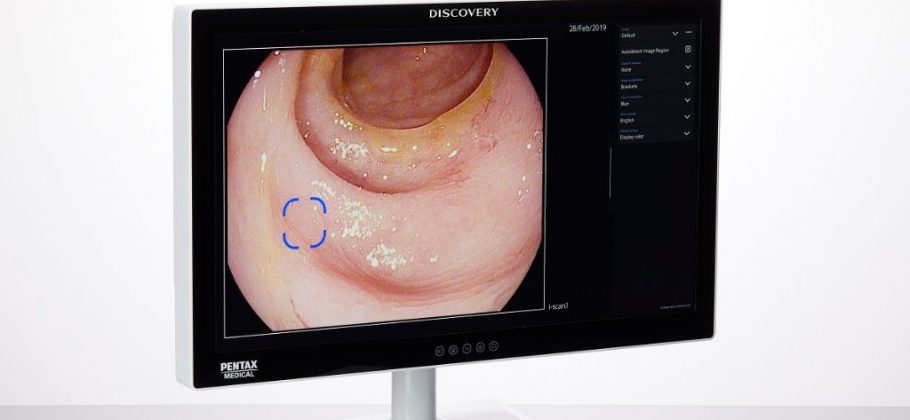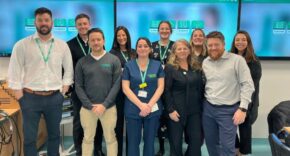In the fight against colorectal cancer, great strides have been taken to protect patients from undetected abnormalities. However, up to 26% of lesions are still missed in examinations.[1] Endoscopists tiredness or distraction can play a role in complicating the detection. Addressing the human factor, and incorporating the use of artificial intelligence in examinations, can help solve colonoscopy challenges.
Prof. Dr. med. Timo Rath provides his personal experience as a Consultant in Gastroenterology and Head of Endoscopic Research at University Hospital Erlangen, Germany, explaining that “we can do better, and we must do better” for patient safety. Patient safety in endoscopy must be approached from a holistic perspective, including solutions which increase detection rates of abnormalities.
The human factor in colonoscopy
Colorectal cancer prevention is the primary goal of screening and diagnostic colonoscopy. The human factor has an impact on complications leading to missed lesions, thus having negative impact on the medical outcomes of examinations. “Let’s face the truth, lesions are missed on a daily basis” shares Prof. Dr. med. Timo Rath. “More than 50% of all interval colorectal cancers arise from lesions that [physicians] indeed miss during screening or surveillance colonoscopies.”
PENTAX Medical DISCOVERY™ provides highly focused assistance during exams
Both fatigue and distractions play a part in these missed lesions during examinations. Due to successive, repetitive procedures, physicians often show signs of fatigue which can lead to fewer lesions detected. Studies show that early-morning cases yielded 27% more polyps per patient than later cases.[2] Furthermore, distractions reduce the ability to concentrate. Physicians are distracted in up to 13% of exam time, i.e. due to phone calls during the exam or external staff entering the room.[3]
By incorporating artificial intelligence in the technology, endoscopists are supported to become more objective and operator independent. No matter how subtle or unremarkable the lesion, the PENTAX Medical DISCOVERY™ assists endoscopists in finding potential polyps. This innovative solution works to protect patient safety by ensuring consistent detection rates, by reducing the risk of the human factor.
Improving visibility and reducing blind spots: increasing confidence in examination outcomes
By incorporating the PENTAX Medical DISCOVERY™ into procedures, consistent detection rates can be ensured and the risk of the human factors decreased. During a first clinical trial it was shown that DISCOVERY™ can increase the ADR, even of experienced endoscopist, by up to 10%.[4] Similarly mechanical enhancement technologies, such as the RetroView™ and G-EYE®, meant that ADR could be increased by 28%.[5]
Speaking from personal experience, Prof. Dr. med. Timo Rath explains: “As endoscopists, one of our major tasks is to reduce the incidence of colorectal cancer. I am very confident that the PENTAX Medical DISCOVERY™ will translate into increasing our own Adenoma Detection Rate and therewith will contribute to reduced colorectal cancer mortality.”
Patient safety through a holistic perspective: the importance of training
In order to further decrease the incidence of colorectal cancer, physicians must be supported from a holistic perspective. This means tackling all challenges in colonoscopy including orientation, detection, characterization, and therapy. Ways to address these challenges include effective equipment for detection, characterization, and also a wide range of therapeutics. Additionally, an increased emphasis on training and education, regarding the proper use of these tools, is an important element of holistic patient safety. If a physician is not sufficiently trained, tools cannot help to determine the appropriate clinical pathway. Investing in training of endoscopists is an important factor to empower greater detection and treatment of gastrointestinal lesions, ultimately improving patient safety. Endoscopists should be supported with solutions that address all daily challenges in colonoscopy, increase the outcomes and efficiency, while enhancing patients satisfaction. This is the holistic approach.
Learn more about the PENTAX Medical DISCOVERY™ and how this technology can support screening and diagnostic colonoscopies in your hospital. Learn more about PENTAX Medical training to best use this innovative technology in your hospital.
[1] van Keulen, K., Soons, E. & Siersema, P. The Role of Behind Folds Visualizing Techniques and Technologies in Improving Adenoma Detection Rate. Curr Treat Options Gastro 17, 394–407 (2019). doi.org/10.1007/s11938-019-00242-5.
[2] Bowman EA, Pfau PR, Mitra A, et al. High Definition Colonoscopy Combined with i-SCAN Imaging Technology Is Superior in the Detection of Adenomas and Advanced Lesions Compared to High Definition Colonoscopy Alone. Diagn Ther Endosc. 2015;2015:167406. doi:10.1155/2015/167406.
[3] “Do absorption and realistic distraction influence performance of component task surgical procedure?”Jon R. Pluyter, Sonja N. Buzink, Anne-F. Rutkowski, Jack J. Jakimowicz; Surg Endosc. 2010 Apr; 24(4): 902–907 Published online 2009 Sep 30.
[4] Pfeifer L, Neufert C, Leppkes M, Waldner MJ, Häfner M, Beyer A, Hoffman A, Siersema PD, Neurath MF, Rath T. Computer-aided detection of colorectal polyps using a newly generated deep convolutional neural network: from development to first clinical experience. Eur J Gastroenterol Hepatol. 2021 May 21. doi: 10.1097/MEG.0000000000002209. Epub ahead of print. PMID: 34034272.
[5] Shirin H, Shpak B, Epshtein J, et al. G-EYE colonoscopy is superior to standard colonoscopy for increasing adenoma detection rate: an international randomized controlled trial. Gastrointest Endosc. 201.













